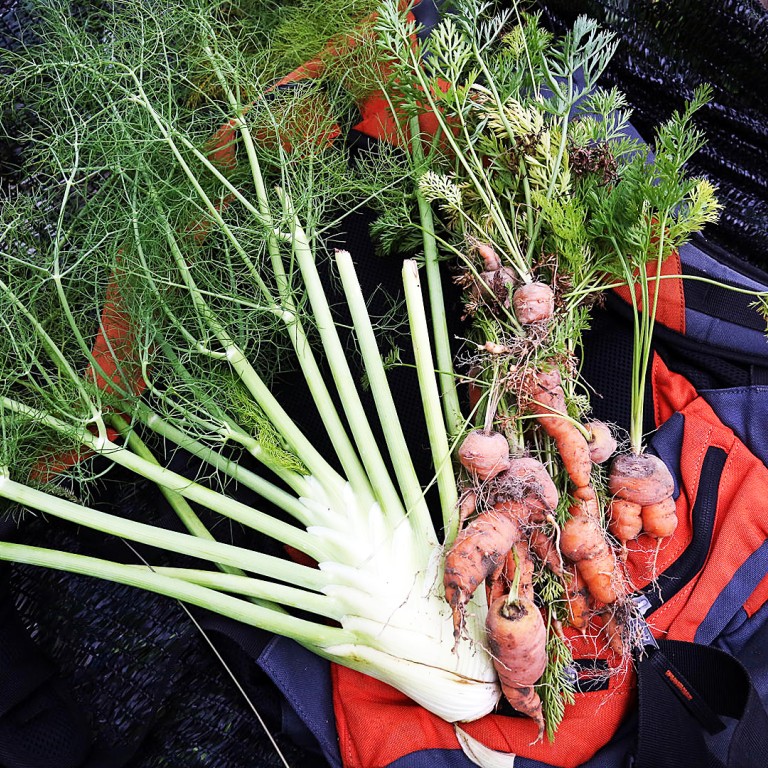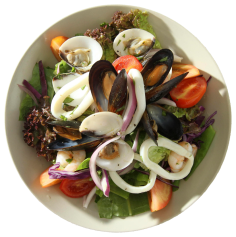
Five Hong Kong restaurants that grow their own produce
In such a crowded city, cultivating your own produce takes time, planning and determination. We visit five restaurants that took up the challenge
As the concept of paddock-to-plate dining takes root in Hong Kong, there is growing demand for sustainably produced fresh food. And every week there are more choices for health-conscious diners in the city. However, due to limited space, few restaurants embracing the movement go beyond growing herbs or a handful of vegetables on their roofs or balconies, or buying ingredients from outside farms.
But a small group of passionate local restaurateurs are taking things a step further by becoming farmers themselves - growing and harvesting their own produce and transforming it into tasty dishes. All of them share the same mission: to bring healthy ingredients to our plates within the shortest possible time, so that we can enjoy a truly fresh meal.
O-Veg
This rustic restaurant in a remote corner of Kam Tin sits among a cluster of wood cabins surrounded by trees. Diners can sit inside the dimly lit cabin or outside on an elevated tatami platform (bring your own mosquito repellent).
The restaurant, which also serves as the Cheung family home, is situated on a 20,000 sq ft compound. They moved to the former chicken farm eight years ago and haven't looked back since. "We only open on Fridays and weekends - the rest of the week is devoted to farming. We source almost all of the ingredients from our 40,000 sq ft farm, which is a 10-minute motorcycle ride away," says Cheung.


"We don't have a menu, so diners never know what they're going to be served. I go to the farm in the afternoon to check what is ready to be harvested and come up with the dishes on the spot. We want to prepare and cook the ingredients in the shortest time after picking."
The menu is strictly vegetarian and service can be sluggish, but for HK$250 per head, guests are served a fresh three-course meal that typically includes a seasonal soup, such as carrot and beetroot with cream, and mains of fusilli pasta with broad beans, chestnut, potato and mushroom.
O-Veg
53 Tai Kong Po, Kam Tin, tel: 2893 3037 (bookings essential)
Lotus Courtyard Restaurant
Set in a peaceful part of Tai Po, this venue boasts a beautiful courtyard environment complete with fish pond, thatched huts and bonsai trees. Michelle Huang, who formerly ran restaurants in Britain, bought it four years ago and set about giving it a complete overhaul.
"I designed everything myself. I want my customers to enjoy the food and the environment," she says.
Besides putting her personal stamp on the property, Huang started farming on two adjoining plots of land covering 5,000 sq ft a 10-minute drive away.


"My staff and I go to the farm every day. We see farming as a form of relaxation," she says. "We grow taro, chayote, papaya, bitter melon and many other fruit and vegetables to serve in the restaurant. We source our meat from overseas, but we do our best to use vegetables from our own farm. It's difficult to do so in summer when the weather is blisteringly hot as many of the plants don't do well under such intense heat."
Lotus Courtyard Restaurant
43 Fong Ma Po, Lam Tsuen Valley, Tai Po, tel: 2653 1313
Fresh & Green
Opened last September, this Italian restaurant has an on-site hydroponic farm that produces 3kg of salad vegetables every day.
The restaurant and the 400 sq ft farm occupy two units on the second floor of a factory in Fo Tan. Its founder, Ken Yuen Chi-hin, says the warehouse was converted from a steel-making facility.
"I had the space to establish a farm right next door to my restaurant," he says.


Without the use of soil, hydroponic farms such as Yuen's are made up of vertical structures where water-filled racks brimming with vegetables are stacked on top of each other.
"A 400 sq ft hydroponic set-up can yield the same as a 3,000 sq ft conventional farm. We even have excess vegetables that we sell to customers," he says. "The indoor farm with controlled temperature, moisture and the use of fluorescent lights substituting sunlight allows us to produce clean and healthy vegetables."
Besides the farm, the restaurant also has a 300 sq ft balcony that grows more than 10 kinds of herbs, including basil, mint and rosemary. Fresh & Green also grow their own mushrooms. "The organic mushroom salad is one of our most popular dishes."
Fresh & Green
Room 203, 2/F, West Wing, World Wide Industrial Centre, 43-47 Shan Mei Street, Fo Tan, tel: 3563 6036
Lung Wah Hotel
To reach this charming restaurant, diners ascend a winding pathway lined with red lanterns. On the way, they pass a 700 sq ft hydroponic farmhouse recently set up to grow vegetables. In spite of its name, the 75-year-old property no longer offers accommodation. It is famed for its roasted pigeon and goose.
The farm grows three kinds of Chinese vegetables, including choi sum, and four varieties of salad leaves to serve to customers. Miranda Chung Wing-huen, who is in charge of the farmhouse, is the daughter of the founder.
"My parents emigrated to Switzerland a decade ago. They also set up a Lung Wah restaurant there. Living in Switzerland, they saw how Western people embraced healthy farming using hydroponics. So they wanted the same thing for their Hong Kong restaurant.


Customers can order the hydroponic vegetables, which are 10 per cent more expensive than the regular fare.
"In June, we are launching a hydroponic family programme. Parents and children can visit us for a day. They will learn about farming in the afternoon and enjoy a feast of roasted goose at night."
Lung Wah Hotel
22 Ha Wo Che Chuen, Sha Tin, tel: 2691 1594
IPC Foodlab


Occupying all seven storeys of an industrial building in Fanling, this ambitious venture includes a compost-making facility, plant nursery, mushroom beds, roof garden and restaurant.
As the name suggests, it is a modern facility that employs cutting-edge farming technology. Mushrooms are grown in a temperature- and humidity-controlled space, fitted with oxygen generators and mist-sprinklers. The focus is on producing fragile vegetables that are easily damaged during transport and varieties with a short shelf life such as almond mushrooms (), a delicate and sweet-tasting species said to have medicinal properties.
When the mushrooms are ready for harvesting after four to six months, they are immediately taken downstairs and used in the restaurant. Similarly, instead of growing zucchini, which is readily available in markets, they aim for speciality items such as artichokes and monks cress (an ornamental salad flower native to South America).

"My job involves sourcing. I work daily with farmers. Besides our own farm upstairs, I also visit about 20 local farms nearby," he says. "For instance, there's a 70-year-old couple who have no phone, no fax and no internet. One week I'll buy 5kg a day of carrots from them, all grown without pesticides. But the next week, they might not have it. We follow the seasons and change our menus accordingly. It is our belief that eating non-seasonal food is not good for the body."
IPC Foodlab
26 On Lok Mun Street, Fanling, tel: 2676 6900
Fresh and healthy food delivered to your door
For those who would rather stay at home, but still enjoy fresh and healthy fare, the following businesses offer sustainably produced foods delivered to your door.
Local chef Peggy Chan opened boutique cafe Prune Organic Deli & Workshop in Sai Ying Pun in 2014. Her latest venture delivers healthy and sustainably sourced dishes to homes, corporate events and private dinner parties. The menu includes approximately 80 items, including salads (below), canapés, appetisers, mains, sandwiches and burgers and desserts. (Tel: 2873 3353)

Hong Kong Markets Organisation recently launched this online platform for green foodies to order organic produce. All the vegetables sold on the site are sourced from more than 20 certified organic farms in the New Territories. It offers vegetables, organic dried herbs, fruits, nuts and other seasonal goods. (Tel: 2851 3220)
This organic grocery delivery service was set up by Todd Darling, the co-owner of Posto Pubblico in SoHo, famous for its commitment to serving fresh local ingredients. Items available for delivery include fruit, eggs and dairy, organic beef, local Wah Kee Farm pork, dry pasta, pasta sauces, flour, snacks and nuts. They also stock organic wine and micro-brewed beer. (Tel: 2671 2771)

